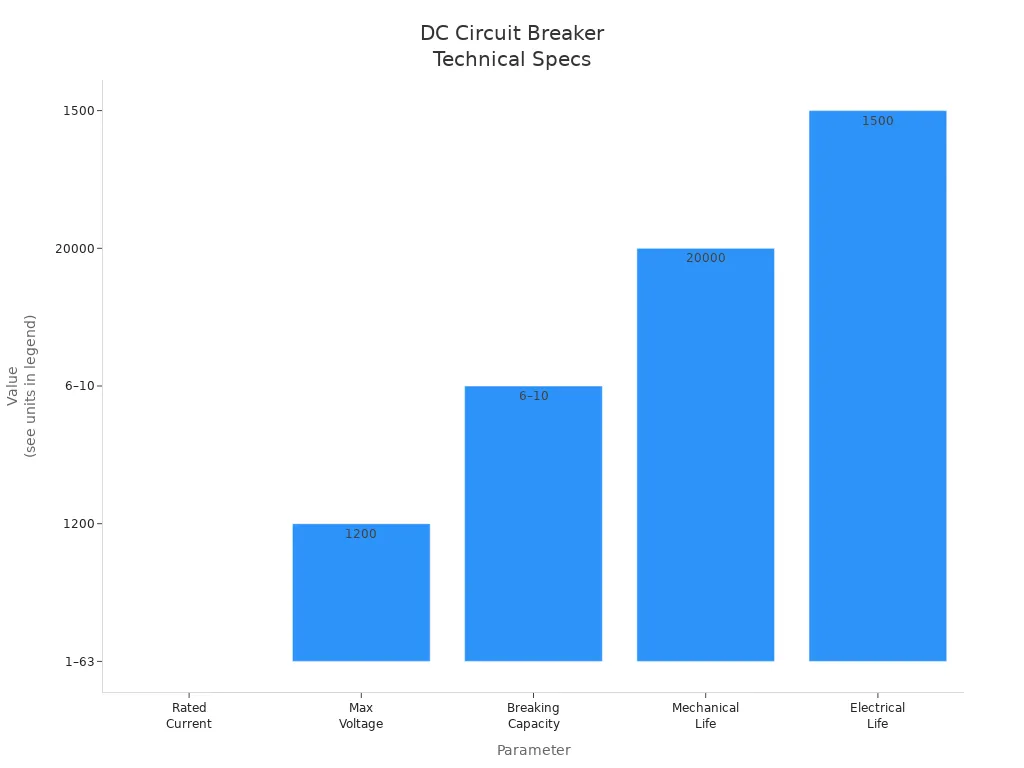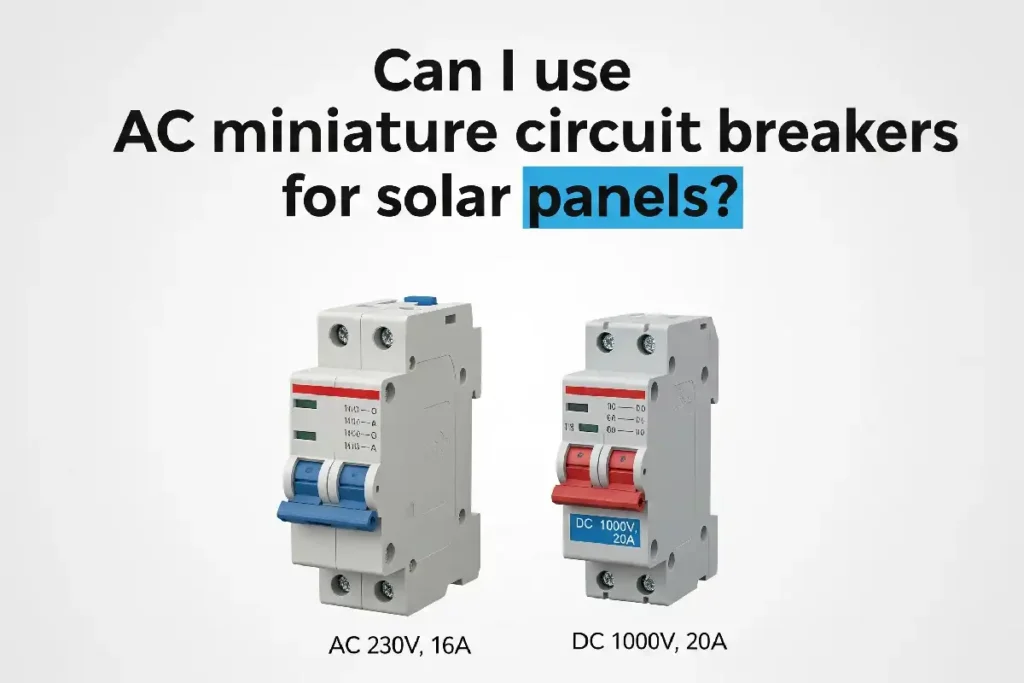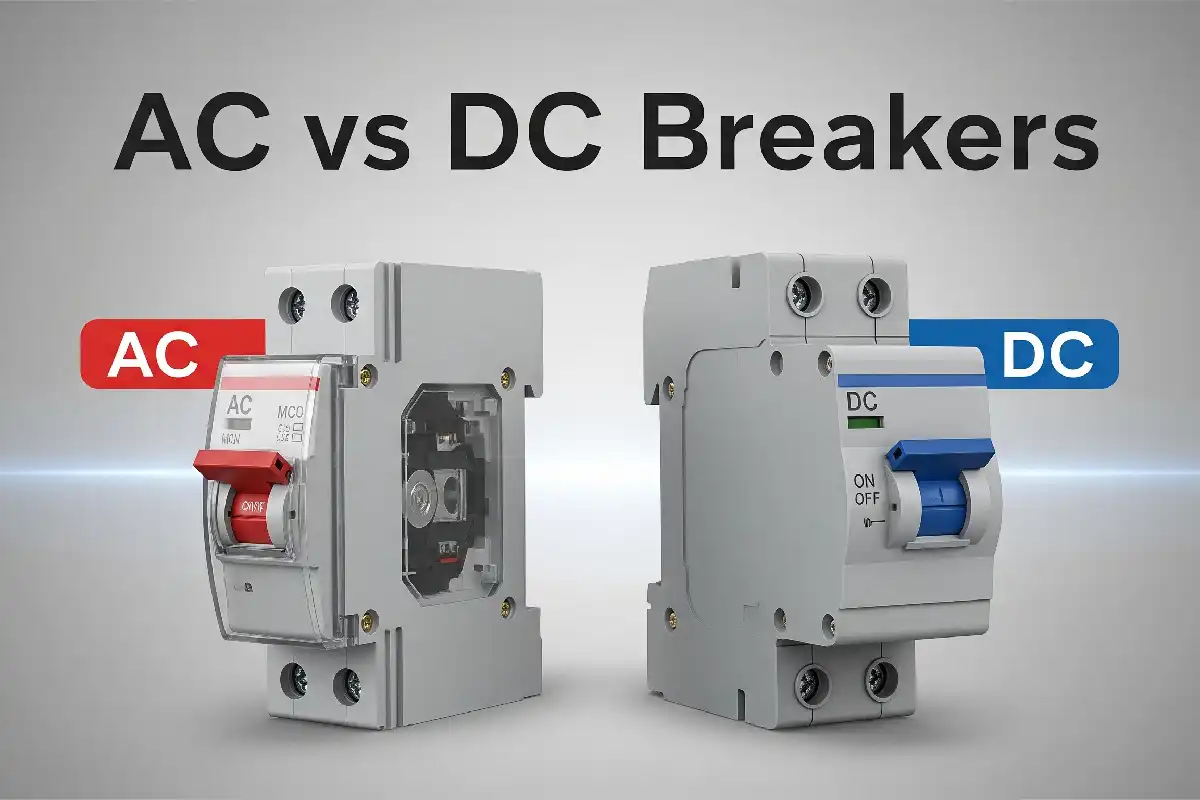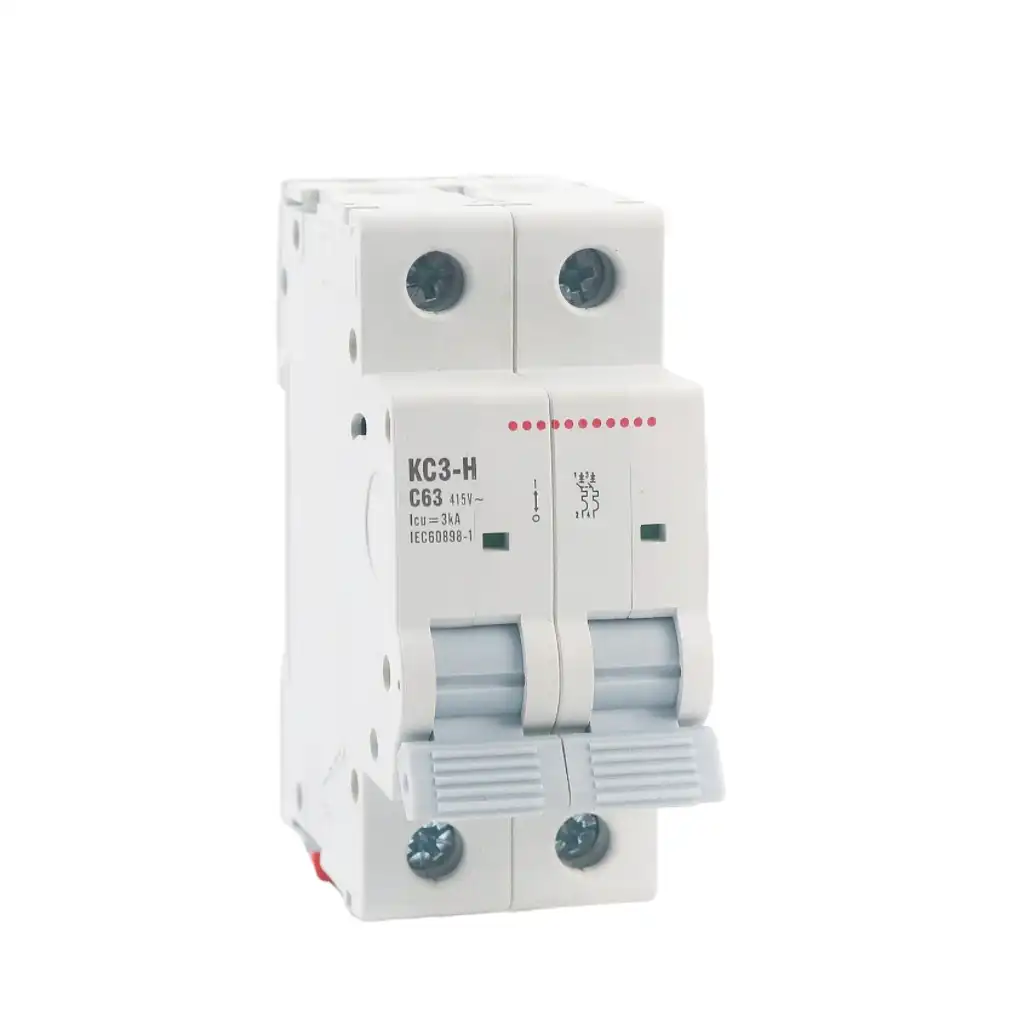You should not use AC miniature circuit breakers for solar panels. AC breakers often cannot handle dangers in solar PV systems. These dangers include arc faults, arc flashes, and too much current. These problems can cause fires or damage equipment. DC-rated breakers are better because they handle direct current safely. A Communication miniature circuit breaker helps you watch and control your solar panel system. With this breaker, you get better safety and alerts right away if something goes wrong.
Key Takeaways
- Do not use AC miniature circuit breakers for solar panels. They cannot safely stop direct current. This can cause fires or damage.
- DC circuit breakers have special parts for direct current. They stop dangerous arcs. They protect your solar system.
- Pick DC breakers with higher voltage and current ratings than your solar panel system. This helps keep your system safe.
- Communication miniature circuit breakers help you watch and control your solar panels from far away. They give real-time alerts. This makes your system safer.
- Always choose certified DC breakers from trusted brands. This keeps your solar system safe, reliable, and lasting a long time.
AC vs. DC Circuit Breakers
Key Differences
It is important to understand how AC and DC circuit breakers work before picking one for your solar panel system. AC circuit breakers are made for alternating current. This type of current changes direction and goes through zero voltage many times each second. DC circuit breakers are for direct current. Direct current only moves in one direction and never goes through zero. Because of this, each breaker stops electricity in a different way.
Here is a table that shows the main differences:
| Feature | AC Circuit Breaker | DC Circuit Breaker |
|---|---|---|
| Arc Extinguishing | Uses natural zero-crossing to stop arcs quickly | Needs special arc suppression methods (magnetic blowout coils, arc chutes) |
| Arc Duration | Shorter, arcs stop at zero crossing | Longer, arcs are harder to stop without special parts |
| Design Complexity | Simpler design | More complex, extra arc control components |
| Cost | Lower | Higher |
AC circuit breakers use the zero-crossing point to help stop electric arcs. This makes them easier to build and cheaper to buy. DC circuit breakers need special parts to control and stop arcs because DC current never crosses zero. These extra parts make DC breakers more complicated and cost more money.
Tip: DC circuit breakers are bigger and heavier because they must handle stronger and longer arcs.
You will see DC breakers on the solar panel side. They protect the PV array, charge controller, and batteries. AC breakers are used after the inverter. They protect the output side and help meet safety rules.
Risks of Using AC Breakers
Using AC circuit breakers in a DC solar panel system is very risky. AC breakers cannot safely stop DC current because DC does not cross zero. This can lead to dangerous problems.
- AC breakers need zero-crossing to stop arcs, but DC current never stops. Arcs can last much longer and get very hot, sometimes over 3,000°C. These high temperatures can melt metal and start fires.
- Long-lasting arcs wear out the inside parts of the breaker very fast. The breaker might stop working in just days or weeks.
- DC current makes steady magnetic fields that are hard to break. AC breakers do not have the special magnetic blowout systems that DC needs.
- Breakers not made for DC can get too hot, sometimes over 200°C during normal use. This can hurt equipment and cause fires.
- Real accidents have happened. Fires in inverter rooms started because AC breakers could not stop DC fault currents.
- AC breakers do not have the bigger contact gaps, arc chutes, or magnetic blowout coils that DC breakers have. Without these, AC breakers cannot protect your solar panel system from DC faults.
- AC breakers are not safe for DC solar panel systems.
- Using the wrong breaker can damage equipment, cause overheating, and start fires.
- DC breakers are made to handle these dangers and keep your solar panel system safe.
⚠️ Warning: Never use AC circuit breakers for DC solar panel protection. Always pick DC-rated breakers for safety and reliability.
Why Choose DC Circuit Breakers
Arc Extinguishing
DC circuit breakers are made to handle direct current. When you open a DC breaker, the current does not stop by itself. This makes the electric arc last longer than in AC systems. DC breakers use strong magnetic coils and extra contact gaps. They also have arc chutes to move and cool the arc fast. These parts help stop the arc before it causes harm.
Note: AC breakers depend on the current dropping to zero often. This makes it easy to stop the arc. DC current never drops to zero, so stopping the arc is harder and needs special parts.
If you use an AC breaker in a DC solar system, the arc might not stop. This can make the breaker get too hot, melt, or even catch fire. Some real accidents happened when AC breakers were used in DC solar systems. These problems caused high resistance, voltage drops, and inverter shutdowns. Over time, this damage can ruin your equipment and make things unsafe.
Voltage Ratings
DC circuit breakers have voltage ratings for solar panel systems. You can find breakers for 48V DC, 80V DC, 150V DC, and up to 1000V DC with special setups. The voltage rating shows the highest voltage the breaker can handle safely. If you use a breaker with a lower voltage rating than your solar array, it may not protect your system.
| Breaker Type | Typical DC Voltage Rating | Notes |
|---|---|---|
| Square D QOU | 48 VDC | Good for small systems; not enough for high-voltage arrays |
| CBI QY | 80 VDC, 125 VDC, 150 VDC | Suitable for many solar arrays |
| Ceramic ABC fuses | 125 VDC | Used for higher voltage protection |
You must pick a DC breaker with a voltage rating as high or higher than your solar panel string’s top voltage. This keeps your system safe and working right.
Safety Standards
DC circuit breakers keep your solar system safe from too much current, arc faults, and ground faults. These breakers follow safety rules for photovoltaic systems. International standards like IEC 61215 and IEC 61730 set rules for solar panels, but not for DC breakers. Still, DC breakers must meet strict safety and performance rules to be used in solar power systems.
- DC breakers help stop fires, equipment damage, and electric shocks.
- They work with other safety devices like DC fuses and disconnect switches.
- The right DC breakers keep your system safe during faults or repairs.
If you do not use certified DC-rated breakers, you could have big problems. These include fires, melted wires, broken inverters, and even injury. For example, if a DC arc fault happens, the heat can melt wires and start a fire in your combiner box. Too much current can ruin your panels and inverters. Ground faults and shock hazards can hurt or kill someone.
⚠️ Warning: Always use DC circuit breakers that meet safety codes and standards. This keeps your home, your equipment, and everyone working on your solar system safe.
Communication Miniature Circuit Breaker in Solar Systems
Monitoring and Control
A Communication miniature circuit breaker helps you control your solar panels better. You can use smart sensors to check things like current, voltage, and power. These breakers send live data to your phone or computer. You can see how much energy your solar panels make and use each day.
You can turn the breaker on or off from anywhere. Remote control lets you manage your solar system without touching it. If you want to turn off a circuit, just tap a button in an app. You can also set times for different circuits to turn on or off. This helps you keep important devices working and turn off others when not needed.
Smart breakers send you alerts if something is wrong. You get a message if the breaker trips or if energy use is too high. This helps you fix problems quickly and keeps your solar system safe.
Communication miniature circuit breakers use Wi-Fi, Bluetooth, or RS485 to connect to your energy management system. You can track energy use, set what is most important, and make sure your solar power works best during the day.
| Feature | What It Does for You |
|---|---|
| Real-time monitoring | Shows energy use and system status |
| Remote control | Lets you open/close circuits from anywhere |
| Scheduling | Runs devices when solar power is strongest |
| Alerts | Warns you about faults or high usage |
Benefits for Solar Panels
A Communication miniature circuit breaker gives your solar panels many good things. You get better safety because the breaker shuts off circuits fast during faults. This stops fires, wire damage, and keeps your equipment safe. The breaker finds problems and acts right away, so you do not have to check everything yourself.
You save money because these breakers can be used again and reset. You do not need to buy new fuses. If a fault happens, you see which circuit tripped and fix it fast. The breaker works well even if your system trips a lot. Its small size fits in tight spaces, so you can use it in modern solar panels.
- You get long-lasting protection. The breaker keeps your system safe for years.
- You can see which part of your system has a problem. This makes fixing things easier.
- You can use different ratings to protect each part of your solar setup. This stops faults from spreading.
Communication miniature circuit breakers help keep your solar panels safe, lower repair costs, and make your system last longer.
Selecting the Right DC Breaker
Current and Voltage Sizing
To pick the right DC breaker, you need to check a few things. First, find out the most current your solar panels will use. You do this by dividing the total panel watts by the system volts. Add about 25% to 30% more for safety. This helps if sunlight or temperature changes. For example, if your panels make 1,000 watts at 100 volts, you get 10 amps. With the safety margin, choose a breaker that can handle at least 13 amps.
You also need to look at the voltage rating. Pick a breaker with a voltage rating higher than your system’s top voltage. This helps stop arcing and keeps things safe. Always use DC breakers because they have special parts to stop arcs. Check for certifications like UL, CE, or IEC to make sure your breaker is safe.
| Certification/Standard | Description |
|---|---|
| IEC 60947-2 / BS EN 60947-2 | Makes sure the breaker is strong and works well |
| IEC 60364-7-712 | Gives rules for putting in solar systems |
| IEC 62109 | Keeps power converters safe in solar setups |

Installation Tips
When you put in DC breakers, pick a dry spot you can reach easily. Attach the breaker panel to something sturdy. Make sure the box has a good IP rating to keep out dust and water. Connect your solar panel wires to the DC breakers. Check the polarity and tighten the wires just right.
Use surge protectors on both the DC and AC sides. Label each breaker so you know what it controls. Choose breakers with lockout features for safe repairs. Check and test your breakers often to find problems early.
Small DC breakers, like the MidNite Solar MNEPV series, fit well in most solar panel boxes. Their small size saves space and keeps things tidy. This design works with most solar panels and wires.
Tip: Do not buy cheap breakers or isolators. Pick good brands like Midnite Solar or Chtaixi. This keeps your solar system safe and working for a long time.
You should not use AC miniature circuit breakers for solar panels. DC-rated breakers are needed for safety and to work well. Experts say you should follow these steps when picking a DC breaker for your solar system:
- Pick a DC breaker with a voltage rating higher than your system’s top voltage.
- Choose a current rating that is a little more than your system’s highest current.
- Make sure the breaker can handle the biggest fault current.
- Check that the breaker follows electrical codes and safety rules.
A Communication miniature circuit breaker lets you see live data and get quick alerts. This helps you keep your solar panel system safe and working well.
If you want to obtain circuit breaker protection for your solar system, the ONESTOP team can provide assistance for you
FAQ
What happens if you use an AC breaker for solar panels?
You risk fire and equipment damage. AC breakers cannot stop DC arcs. The breaker may overheat, melt, or fail to protect your solar system. Always use DC-rated breakers for safety.
What makes DC circuit breakers different from AC ones?
DC breakers have special parts like arc chutes and magnetic coils. These help stop long-lasting DC arcs. AC breakers use zero-crossing, which does not work for DC current.
What should you check before buying a DC breaker for solar panels?
You need to check the voltage and current ratings. Make sure the breaker meets safety standards like UL or IEC. Pick a breaker that fits your panel box and wires.
What is a Communication miniature circuit breaker?
A Communication miniature circuit breaker lets you monitor and control your solar system remotely. You get real-time alerts, energy data, and can turn circuits on or off using your phone or computer.
What certifications should your DC breaker have?
Look for certifications like UL, CE, or IEC. These show the breaker meets safety and quality standards. Certified breakers protect your solar panels and keep your system safe.
See also
How to avoid common mistakes with AC and DC miniature circuit breakers
Which Communication Surge Protector Is Right for You in 2025
Understanding DC Miniature Circuit Breakers for Beginners
The difference between type A and AC RCD
How to Choose a Solar DC MCB for Maximum Protection






